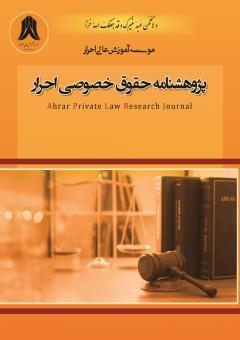The Effect of Divorce Before Intimacy on the Cancellation of Dowry
Subject Areas : Civil LawMohammad ali Rasouli moghadam 1
1 - Master student of Private Law, Department of Law, Faculty of Humanities, Rasht Branch, Islamic Azad University, Rasht, Iran.
Keywords: release, release of dowry of bride, divorcing before intercourse.,
Abstract :
In the article 1092 of Civil Rights, it is mentioned that: “ If the husband divorces his wife before having intercourse, she is entitled to the half of dowry of bride and if the husband had given more than half of dowry of bride before the intercourse, he would have entitled to the residue of the half of itself or its price.”, in this case; the question is that if the wife forgives release all or more than half of(dowry of bride, which is exactly the husband’s total duty ) after marriage contract and the husband divorces her before having intercourse with her, since release is a kind of possessing and domination of the debt or is similar to the loyalty to a pledge, and considering the command in the article above; does the wife owes the residue of the half of dowry of bride The popular response to this question by the Faghihs of Imamia is positive whereas other Faghihs and lawyers disagree with their view. While studying this subject; in this essay, we will try to understand the evidences of those in favor and opponents of this and will observe some aspects of the topic that have been less taken into consideration.
1. Imamieh, S H.(1998).Civil Law, Islamic Publications, Tehran , vol. 1. [In Persian]
2. Imamieh, S H.(1998). Civil Law, Islamic Publications, Tehran , vol. 4. [In Persian]
3. Ansari, M and Taheri, M A. (2005). Private Law Encyclopedia, vol. 1, first edition, Mehrab Publications, Tehran , p. 110. [In Persian]
4. Har Ameli, Sh.(1992). Wassail al-Shia ila Tahsil Masail al-Shariah, Al al-Bayt Institute for the Revival of Heritage, Qom. [In Persian]
5. Khomeini, R.(2007). Translation of Tahrir al-Wasilah, Imam Khomeini's Works and Publications Organization, Qom. [In Persian]
6. Shahid Awwal, M.(2008) Luma Damascusia, translated by Shirvani, Ali, Dar al-Fikr Publications, Qom , vol. 2[In Persian]
7. Shahid Thani, Z.(2010). Translation of Legal Issues in Luma, compiled and translated by Asadullah Lotfi Majd, Tehran. [In Persian]
8. Shahidi, M.(2004). Collapse of Commitments, Majd Publications, Tehran. [In Persian]
9. Safaei, S H and Emami, A.(2008). Family Law, University of Tehran Press and Print, Tehran , vol. 1. [In Persian]
10. Fayd al-Islam, N.(2001). translated by Dashti, 10th edition, Tabaan Publications, Qom. [In Persian]
11. Qomi, M A.(1992). Jame' al-Shatat, edited and supervised by Morteza Razavi, Keyhan Institute, Tehran , vol. 4. [In Persian]
12. Mohaqeq Damad, S M.(2008). A Jurisprudential Study of Family Law: Marriage and Its Dissolution, Center for Islamic Sciences Publications, Tehran. [In Persian]
13. Katouzian, N.(2008). Civil Law (Obligations), Mizan Publications, Tehran. [In Persian]
14. Katouzian, N.(1999). Civil Law (Family Law), Bahman Borna Publications, Tehran , vol. 1. [In Persian]
15. Najafi, M H.(1987). Jawahir al-Kalam fi Sharh Shara'i al-Islam, Dar al-Ketab al-Islamiyah Publications, Tehran , vol. 31. [In Persian]
16. Nuri, M H.(1986). Mustadrak al-Wasa'il, Al al-Bayt Institute, Qom , vol. 15. [In Persian]
17. Parsapour, M B.(2003).Cancellation in Iranian and English Laws, Legal Articles Bank (www.lawnet.ir) [In Persian]
18. Velayoon, R.(2007). Conflict of Logic and Justice in the Cancellation and Giving of Dowry, Journal of Law and Political Science, University of Tehran, vol. 37, no. 4, winter. [In Persian]
19. Holy Quran


